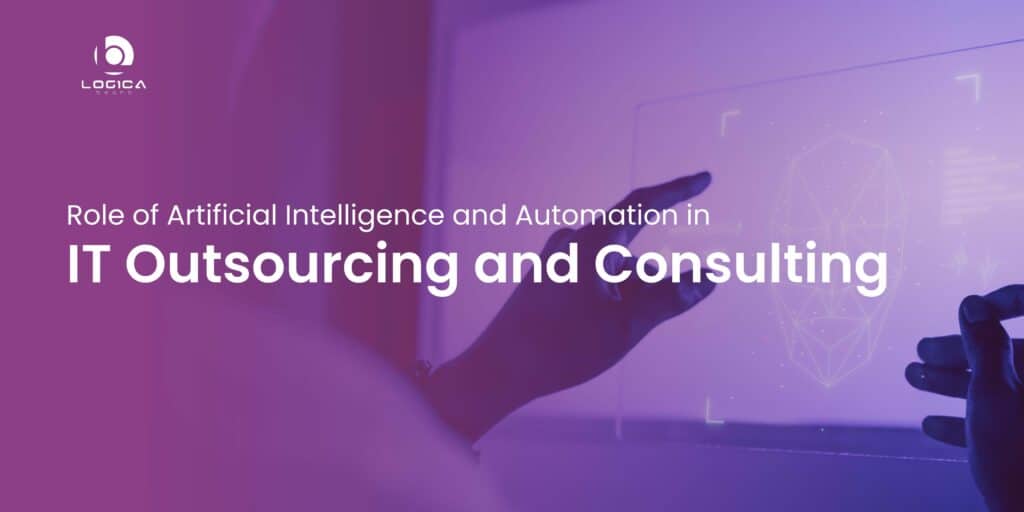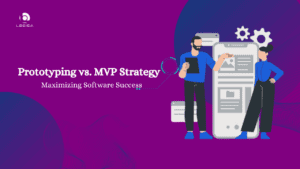In today’s ever-evolving technological landscape, Artificial Intelligence (AI) and automation have become buzzwords that dominate conversations surrounding the future of work. With the rise of these technologies, IT outsourcing and consulting have also undergone a significant transformation. The advent of artificial intelligence and automation in IT outsourcing and consulting has provided businesses with the opportunity to optimize their IT operations, streamline their processes, and reduce costs, leading to an increased demand for these services.
In this blog, we will explore the role of artificial intelligence and automation in IT outsourcing and consulting, their impact on businesses, and how they are changing the face of IT outsourcing and consulting as we know it. We will also examine some of the benefits and challenges associated with artificial intelligence and automation in this field and discuss the future of IT outsourcing and consulting in the age of AI and automation.
Brief overview of artificial intelligence and automation
Artificial intelligence (AI) and automation have grown increasingly significant in IT outsourcing and consulting as technology advances. The creation of intelligent computer systems capable of doing activities that normally require human intellect, such as decision-making, problem-solving, and natural language processing, is referred to as AI. In contrast, automation refers to the use of technology to execute repetitive activities with minimum human participation.
Artificial intelligence (AI) is the creation of intelligent computer systems capable of doing activities that normally require human intellect, such as problem solving, decision making, and natural language processing. AI systems are built to examine data, learn from patterns, and make predictions or suggestions based on the information.
In contrast, automation refers to the use of technology to do activities with minimum human participation. By reducing repetitive or time-consuming procedures, automation technologies can be utilized to simplify processes, decrease mistakes, and boost productivity.
Artificial intelligence and automation in IT outsourcing and consulting are transforming the way organization’s function, allowing them to achieve better efficiency, lower costs, and enhance outcomes. They are used to give real-time insights, automate activities, and enhance decision-making in a variety of sectors, including IT outsourcing and consulting.
Artificial intelligence and automation in IT outsourcing and consulting are quickly evolving, and these technologies are divided into various subfields. Machine learning (ML), for example, is an AI branch that includes the construction of algorithms that can learn from data and improve their performance over time. Deep learning is a kind of machine learning that uses neural networks to process and analyze massive datasets.
AI and automation are being used to simplify operations and decrease costs in the context of IT outsourcing and consulting. AI-powered chatbots, for example, can manage consumer enquiries and support requests, minimizing the need for human engagement. Automatic data processing and analysis can assist firms in making better decisions based on real-time data, and predictive analytics can assist in identifying possible concerns before they become problems.
AI and automation are also being utilized to boost human employees’ skills. AI-powered solutions, for example, can assist IT consultants in analyzing complicated information and identifying trends or abnormalities that people can miss. This can help consultants deliver more accurate and insightful advice to their customers, resulting in better outcomes and lower costs.
Overall, artificial intelligence and automation are revolutionizing the IT outsourcing and consulting industries, allowing organizations to function more efficiently and effectively in an increasingly complicated and competitive business environment. As these technologies mature, their effect is expected to rise, opening new options for organizations to enhance their operations and achieve their objectives.
Impacts of artificial intelligence and automation in IT outsourcing and consulting
Artificial intelligence and automation in IT outsourcing and consulting are changing the way business firms function today. AI and automation are gaining traction in the industry of IT outsourcing and consulting, providing more efficient services, lowering costs and allowing speedier decision-making. The desire for firms to be more flexible and competitive in a quickly changing digital world has pushed the adoption of these technologies. While AI and automation have many good effects in IT outsourcing and consulting, there are also worries about job loss and the need to upskill the workforce.
In this section we will talk about the impacts of artificial intelligence and automation in IT outsourcing and consulting.
● Cost reduction
The use of artificial intelligence and automation in IT outsourcing and consulting has significantly reduced corporate expenses. These technologies have been able to automate formerly manual procedures, lowering the amount of human resources required to do the same activity. Chatbots, for example, can answer client questions, freeing up human support employees to address more difficult issues.
● Improved efficiency and productivity
Increased efficiency and productivity as a result of artificial intelligence and automation in IT outsourcing has also contributed to significant commercial benefits. Businesses can free up their workers’ time to focus on more strategic and value-added activities, such as innovation and creativity, by automating repetitive and time-consuming processes. This increases efficiency and makes greater use of staff abilities, while lowering the risk of human mistakes.
● Improved data analysis and decision-making
Another key influence of artificial intelligence and automation in IT outsourcing is improved data analysis and decision-making. These technologies have the ability to handle massive volumes of data in real time, offering important insights into customer behavior, market trends, and corporate operations. The data acquired from this analysis can subsequently be utilized to make educated business choices, such as expanding product offerings and improving customer experiences.
● Enhanced customer experience
The other significant consequence of AI and automation technologies in IT outsourcing is improved client experience. These technologies have the potential to automate the delivery of customized services to clients based on their choices and behavior, resulting in increased customer satisfaction and loyalty. AI-powered recommendation systems, for example, can present clients with personalized recommendations based on their purchase history and online behavior.
● Rise of RPA (Robotic Process Automation)
The rise of robotic process automation (RPA) technology is a new trend in artificial intelligence (AI) and automation technologies in IT outsourcing. RPA is the use of software robots to automate repetitive, monotonous operations like data input and invoicing processing. This technology has aided in the reduction of manual mistakes, the improvement of accuracy, and the acceleration of procedures.
The impacts of artificial intelligence and automation technologies on IT outsourcing has been considerable in terms of lower costs, higher efficiency, improved data analysis and decision-making, improved customer experiences, and the growth of RPA technology. These technologies will definitely provide further benefits to the outsourcing business as they evolve and become more generally accepted.
Role of artificial intelligence and automation in IT outsourcing and consulting
The role of artificial intelligence is given below:
● Improved project management
Artificial intelligence and automation can improve project management in IT consulting by delivering real-time data insights, automating project tracking, and monitoring resource allocation. AI can assist detect project hazards and provide recommendations to reduce them.
For example, project management software that employs AI algorithms can examine historical data to discover variables that have resulted in project delays or budget overruns. This data can then be utilized to build predictive models that can assist foresee and manage similar risks in future projects. Automation can also assist in guaranteeing that activities are performed on time and project schedules are fulfilled, resulting in improved project outcomes.
● Better Resource Allocation and Utilization
AI and automation can help IT consultants better allocate and utilize their resources. Automatic tools can examine resource availability and capacity, optimize resource allocation based on project objectives, and detect resource underutilization regions. AI-powered software, for example, can examine project timelines, historical data, and resource availability to maximize resource allocation efficiency. This results in increased efficiency, lower costs, and better business outcomes.
● Enhanced Risk Assessment and Mitigation
By evaluating historical data, recognizing trends, and generating forecasts, AI and automation can improve risk assessment and mitigation in IT consulting. Automatic systems can also alert consultants to possible dangers and give mitigation advice. Machine learning algorithms, for example, can identify patterns of risk factors that can cause project delays or budget overruns, allowing consultants to take remedial steps before problems arise. As a result, risk management improves, decision-making improves, and project outcomes improve.
● Improved Quality Control and Assurance
AI and automation can improve quality control and assurance by automating operations like testing, bug tracking, and error identification. Automatic technologies can quickly identify problems and propose solutions. For example, AI-powered software can evaluate code for flaws, grammatical problems, and vulnerabilities, allowing developers to address these issues before they impact the user experience. This results in higher-quality products, fewer mistakes, and, ultimately, greater customer satisfaction.
● Increased Business Intelligence and Insights
AI and automation can help IT consultants gain a better understanding of business performance, client behavior, and market trends. Automatic systems can evaluate enormous amounts of data fast and generate insights that can be utilized to make educated decisions. AI-powered software, for example, can analyze consumer data to find trends in customer behavior, preferences, and demographics. This information can then be utilized to target particular client categories with marketing campaigns and product offerings. As a result, business intelligence improves, decision-making improves, and business results improve.
● Improved customer engagement and support
AI and automation can increase client engagement and support in IT consulting by delivering faster response times, tailored advice, and round-the-clock assistance. Chatbots, for example, can be programmed to answer simple consumer enquiries and guide them to pertinent information or resources. This allows IT experts to focus on more complicated issues while still ensuring that consumers receive prompt and accurate assistance. Furthermore, AI-powered software can evaluate client data to make tailored suggestions for items or services that fit their requirements. This increases client happiness and loyalty.
● Increased collaboration and knowledge sharing
AI and automation can promote more cooperation and knowledge sharing in IT consulting by enabling real-time communication and information exchange. For example, project management software can link with collaboration technologies like Slack or Microsoft Teams to allow team members to chat and share information in real time.
AI-powered software can also help with information sharing by offering insights into how teams can operate more effectively, finding knowledge gaps, and proposing training or development opportunities. This leads to stronger cooperation, information exchange, and, eventually, better project outcomes.
Ultimately, the aim of AI and automation in IT consulting is to equip consultants with the tools they need to work better, quicker, and more efficiently. AI and automation can help IT consultants offer better results for their clients by enhancing project management, resource allocation, risk assessment, quality control, and business intelligence.
Future of artificial intelligence and automation in IT outsourcing and consultation
Artificial intelligence and automation in IT outsourcing and consulting have already had a substantial influence on enterprises, lowering costs, increasing productivity, and improving the customer experience. Yet, the future of AI and automation in these areas seems much brighter. As these technologies progress, they are expected to generate new possibilities for organizations and individuals while also changing the way work is done.
Let’s discuss the future of artificial intelligence and automation in IT outsourcing and consultation.
● Increased Adoption of AI and Automation
Artificial intelligence and automation are predicted to be increasingly used in IT outsourcing and consulting in the future. Because of the rising availability and affordability of AI and automation technologies, as well as their demonstrated benefits, more organizations will employ these technologies to gain a competitive edge. This tendency is projected to be especially strong in data-intensive areas such as banking, healthcare, and retail.
● Continued Advancements in AI and Automation
Artificial intelligence and automation advancements are projected to continue, resulting in increasingly complex and powerful technology. These improvements are expected to result in new artificial intelligence and automation use cases and applications in IT outsourcing and consulting. For example, AI technology can improve their grasp of natural language, allowing for more complex chatbots and voice assistants. Similarly, automation technology can become more versatile and flexible, enabling organizations to automate a broader range of operations.
● Emergence of New Opportunities
Increased artificial intelligence and automation in IT outsourcing and consulting is anticipated to provide new possibilities for enterprises and individuals. For example, as firms strive to integrate and optimize AI and automation technologies, the demand for professionals in these fields will expand. Likewise, firms specializing in AI and automation technologies can arise, offering consulting services and solutions to assist other businesses in implementing these technologies.
● Broader Adoption in Other Industries
AI and automation are expected to extend to other industries as they are used in IT outsourcing and consulting. Businesses in other industries will discover new applications for these technologies as they progress and become more accessible. AI and automation technology, for example, can be utilized to automate industrial operations or enhance supply chain management. This increased use of AI and automation across sectors will almost certainly result in new use cases and breakthroughs, propelling further developments in these technologies.
● Increased focus on ethical and social implications
As AI and automation technologies grow more prevalent in IT outsourcing and consulting, a greater emphasis will be placed on their ethical and societal consequences. For example, there can be worries about AI algorithm bias and fairness, as well as the influence of automation on job displacement. To address these problems, organizations and industry experts must emphasize ethical and social considerations while deploying and employing new technologies.
● Integration with other technologies
Artificial intelligence and automation technologies are likely to become more integrated with other technologies, such as cloud computing, the Internet of Things (IoT), and blockchain. This integration will enable more advanced and complex use cases, such as using AI to analyze data collected from IoT devices or using blockchain to ensure the security and transparency of AI-generated decisions.
● Transformation of the workforce
The growing use of artificial intelligence and automation in IT outsourcing and consulting will almost certainly change the workforce. While these technologies can result in employment displacement in certain sectors, they can also open new possibilities for professionals with AI, automation, and data analysis abilities. Moreover, new technologies can result in a shift in the sorts of skills most in demand, with a higher focus on technical abilities and data literacy.
Overall, the future of artificial intelligence and automation in IT outsourcing and consulting is likely to be marked by continued growth, integration with other technologies, and a greater focus on ethical and social implications. The transformation of the workforce and the emergence of new opportunities are also likely to be significant trends in the years to come.
Conclusion
The role of artificial intelligence and automation in IT outsourcing and consulting has transformed the way that businesses operate. From improved project management to increased business intelligence and insights, these technologies have enabled businesses to streamline processes, reduce costs, and enhance the customer experience. However, as these technologies continue to advance, it is essential to consider their ethical and social implications, as well as their impact on the workforce. Looking to the future, the adoption of artificial intelligence and automation in IT outsourcing and consulting is likely to increase, leading to continued advancements and the emergence of new opportunities.











